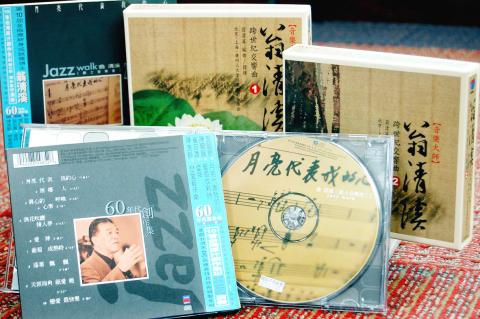Veteran composer Weng Ching-hsi (翁清溪) died in August last year at the age 76, but the news was not made public until earlier this week.
Attorney Hsu Tse-yu (徐則鈺), who represented Weng in his copyright lawsuit against Leico Record Factory Co three years ago, confirmed Weng’s passing, saying the composer’s wife, Chen Li-hua (陳麗花), had informed him of the news in a telephone call in August.
Music Copyright Society of Chinese Taipei staff member Cheng Ting-ling (鄭婷玲), who is in charge of the copyrights on Weng’s songs, also confirmed his death.

Photo: George Tsorng, Taipei Times
Cheng said the organization had announced on its official Web site that Chen was entitled to inherit Weng’s music copyrights, so long as she presented relevant documentation to finalize the inheritance procedures.
Both Hsu and Cheng said they did not know the reasons why Weng’s family kept his death from the public.
News of Weng’s passing did not come to light until a documentary filmmaker contacted the family in March this year because he wanted to use the composer’s songs in his movie.
“Where there are ethnically Chinese people, there are sounds of Wang’s songs being sung. His works have left an indelible imprint in the memories of people of my generation. How come no one was aware of the passing of such an important musical figure?” the filmmaker said.
Since entering the music industry at age 16, Weng composed more than 1,000 songs under various pseudonyms, including Tang Ni (湯尼), Po Tu (波度) and Kuang Yang (光陽).
His most famous works included The Moon Represents My Heart (月亮代表我的心) and The Story of a Small Town (小城故事多), both of which were sung by Teresa Teng (鄧麗君).
Weng won the award for Best Original Film Song at the 18th Golden Horse Awards in 1981 for his work on the Taiwanese movie My Native Land (原鄉人), and was honored with the lifetime achievement award at the 10th Golden Melody Awards in 1999.
He also garnered the best music award for the Taiwanese film Lament of the Sand River (沙河悲歌) at the Asia-Pacific Film Festival in 2000.
Taiwanese director Lee Hsing (李行), whose work Posterity and Perplexity (碧雲天) brought Weng into the movie industry, said it was regrettable that Weng’s family did not notify him of Weng’s death.
Lee said he had invited Weng to compose music for his stage play Summer Snow (夏雪) in 2011, but he later resigned due to physical ailments.
“I had tried to visit Weng at his home in June last year after learning that he had some heart problems, but Chen refused to let me in, saying that Weng’s ‘sickly appearance’ was unfit for a visit,” Lee said.
Lee said he had made several telephone calls to Weng’s landline afterward, but they always went unanswered.
However, there is speculation the family decided to keep Weng’s death a secret because of the substantial royalties he received for his works each year and a dispute over how to distribute them.

SHIPS, TRAINS AND AUTOMOBILES: The ministry has announced changes to varied transportation industries taking effect soon, with a number of effects for passengers Beginning next month, the post office is canceling signature upon delivery and written inquiry services for international registered small packets in accordance with the new policy of the Universal Postal Union, the Ministry of Transportation and Communications said yesterday. The new policy does not apply to packets that are to be delivered to China, the ministry said. Senders of international registered small packets would receive a NT$10 rebate on postage if the packets are sent from Jan. 1 to March 31, it added. The ministry said that three other policies are also scheduled to take effect next month. International cruise ship operators

HORROR STORIES: One victim recounted not realizing they had been stabbed and seeing people bleeding, while another recalled breaking down in tears after fleeing A man on Friday died after he tried to fight the knife-wielding suspect who went on a stabbing spree near two of Taipei’s busiest metro stations, Taipei Mayor Chiang Wan-an (蔣萬安) said. The 57-year-old man, identified by his family name, Yu (余), encountered the suspect at Exit M7 of Taipei Main Station and immediately tried to stop him, but was fatally wounded and later died, Chiang said, calling the incident “heartbreaking.” Yu’s family would receive at least NT$5 million (US$158,584) in compensation through the Taipei Rapid Transit Corp’s (TRTC) insurance coverage, he said after convening an emergency security response meeting yesterday morning. National

PLANNED: The suspect visited the crime scene before the killings, seeking information on how to access the roof, and had extensively researched a 2014 stabbing incident The suspect in a stabbing attack that killed three people and injured 11 in Taipei on Friday had planned the assault and set fires at other locations earlier in the day, law enforcement officials said yesterday. National Police Agency (NPA) Director-General Chang Jung-hsin (張榮興) said the suspect, a 27-year-old man named Chang Wen (張文), began the attacks at 3:40pm, first setting off smoke bombs on a road, damaging cars and motorbikes. Earlier, Chang Wen set fire to a rental room where he was staying on Gongyuan Road in Zhongzheng District (中正), Chang Jung-hsin said. The suspect later threw smoke grenades near two exits

The Forestry and Nature Conservation Agency yesterday launched a gift box to market honey “certified by a Formosan black bear” in appreciation of a beekeeper’s amicable interaction with a honey-thieving bear. Beekeeper Chih Ming-chen (池明鎮) in January inspected his bee farm in Hualien County’s Jhuosi Township (卓溪) and found that more than 20 beehives had been destroyed and many hives were eaten, with bear droppings and paw prints near the destroyed hives, the agency said. Chih returned to the farm to move the remaining beehives away that evening when he encountered a Formosan black bear only 20m away, the agency said. The bear